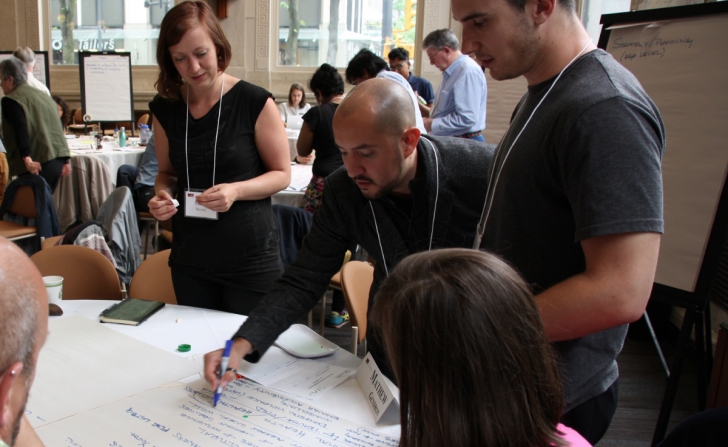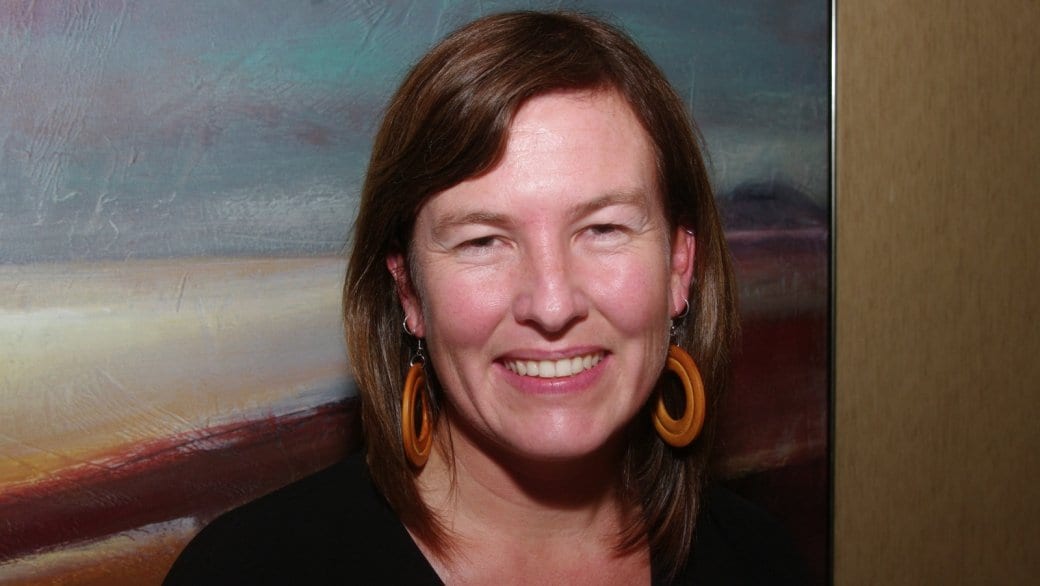After “10 concentrated months” of community consultation involving more than 750 people, Qmunity executive director Dara Parker says BC’s queer resource centre is closer to finding a space for its new facility.
“I think we’re closer but I have nothing to announce,” Parker told attendees of a LOUD Foundation lunch on Feb 12, 2016.
Qmunity has been searching for a site to build a new queer community centre since the City of Vancouver allocated $7 million to the project in December 2013.
“We do so much work in the background trying to identify that site — which is the next step,” Parker says. “In 2014 I said, ‘We’re going to have a space by the end of the year, everyone.’ And now we don’t set timeliness because it’s a year and a half later and I haven’t delivered on that.”
“But I can assure you we’re working really hard,” she says, “and I’m hopeful there will be news this year about acquiring a space.”
Parker presented findings from the final report of Qmunity’s consultation, released Feb 24, to members of BC’s gay and lesbian business association at the LOUD lunch.
She says the consultation — which included a full-day event in May 2015, eight focus groups and an online survey — reflects the most important issues to Vancouver’s LGBT community and how those issues should help shape the new space.
“If there was one dominant theme that we picked up in those multiple engagements it’s the idea of an inclusive and welcoming space,” she says.
“It didn’t come as a surprise that this is the number one thing people said in different ways over and over again — that we need to create a space where everyone feels safe,” she says.
“I think the reflection there is that a lot of spaces don’t feel safe to this day,” she says. “You know all the examples, but there are certain spaces that are safer than others and people were in consensus that we need a safe space for queer and trans folks.”

(Participants in Qmunity’s full-day consultation in May 27, 2015, identified inclusivity as a top priority for a new queer community centre in Vancouver./James Goldie photo)
According to the report, participants endorsed Qmunity’s role in directing the new space but emphasized the need to include the “full spectrum of LGBTQ communities” at all levels of programming and services, including staff positions.
Participants suggested Qmunity could best serve as facilitator and coordinator of the new centre, rather than trying to do everything itself. To this end, they urged Qmunity to build strong partnerships with other organizations that serve LGBT people.
Overall, respondents named Qmunity’s youth programming as its most important service. The STI testing and education, information and referral services, and trans advocacy supports were also considered important.
In addition to its full-day consultation and its online survey, Qmunity consulted eight subgroups in small-dialogue sessions: youth, people of colour, seniors, trans people, families, disabled people, indigenous people and immigrants.
The seniors group highlighted the importance of intergenerational dialogue, where youth could, for example, mentor seniors on the use of technology, while seniors could offer youth advice on life.
For the trans group, monthly clinics for health and legal issues were named as a high priority, while participants in the Aboriginal/Two-Spirit group (which saw the highest turnout with 17 participants) expressed a desire to see their art, culture, history, language and traditions reflected in the new space.
Throughout the consultation process, participants from all walks of life stressed the importance of programming and services that address the intersecting identities of LGBT people, Parker told the LOUD lunch attendees.
“We need to look at the intersection of our identities because I think there’s a risk that people are getting left behind,” she says, citing race, religion, economic class and immigration status as a few possible points of intersection.
The consultation also revealed a need for greater services and support to people who reside outside the Lower Mainland, Parker notes.
“We love that the centre is going to be in the West End and in the heart of the gaybourhhood,” she says, “but we’re everywhere so it’s a lot harder for people in Nanaimo, Fort St John or even Surrey, where there’s decreased visibility and not always the same resources — rarely the same resources and often not the same competencies that exist among service providers here.”
Of its 629 respondents, the online Building Qmunity survey saw a large response from communities outside the Lower Mainland, with 32 percent residing outside of Vancouver.
With the consultation complete, Parker says Qmunity will keep working with the city, businesses and the community to identify a new home.
“We’ll continue to talk to all the politicians at city hall and other levels to make sure this is at the top of their radar,” she says. “I have my weekly talk at city hall and they hear my voice a lot, and I do genuinely believe they are a strong partner and champion in this.”
Parker says the $7-million city grant earmarked in 2013 will cover the construction costs for a new 10,000-square foot facility but not its ongoing maintenance.
“We’re not trying to be a full-service community centre but I think we’ll fill up that space immediately,” she says, “so it’s a matter of building the right space right now, as well as addressing the long-term sustainability.”
It’s important to build a new facility that doesn’t “go under in three years,” she says. “[We] want to make sure we have a long-term financial operating plan that’s sustainable because it’s going to be a lot more expensive for us to offer a shiny new space.”

 Why you can trust Xtra
Why you can trust Xtra


